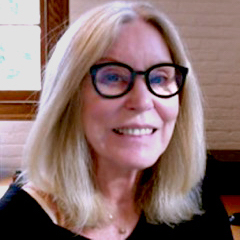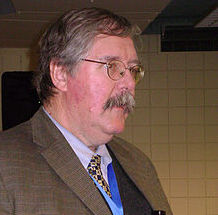** All three keynote lectures will take place at the Centre Mont-Royal, located at 2200 Mansfield Street, a few minutes from the McGill campus. **
We are delighted to have Elizabeth Guffey and Marin Dacos as keynote speakers for DH2017. Guffey and Dacos have been invited as internationally renowned scholars working on issues of access (the conference theme). In addition, the 2017 Antonio Zampolli Prize will be awarded to the Textual Encoding Initiative (TEI) community, and there will be a keynote lecture with three foundational figures in the history of the TEI: Nancy Ide, Michael Sperberg-McQueen, and Lou Burnard.
 Elizabeth Guffey directs the Masters Program in Modern and Contemporary Art at the State University of New York, Purchase College. She is the author of numerous publications, including Retr0: The Culture of Revival (Reaktion, 2006) and Posters: A Global History (Reaktion, 2015). Her most recent work involves disability and access, and her book Designing Disability: Spaces, Symbols and Society will be published later this year by Bloomsbury. Professor Guffey is also the founding editor of Design and Culture, a peer-review journal published by Routledge. The title of her plenary lecture is “The Upside-Down Politics of Access in the Digital Age”.
Elizabeth Guffey directs the Masters Program in Modern and Contemporary Art at the State University of New York, Purchase College. She is the author of numerous publications, including Retr0: The Culture of Revival (Reaktion, 2006) and Posters: A Global History (Reaktion, 2015). Her most recent work involves disability and access, and her book Designing Disability: Spaces, Symbols and Society will be published later this year by Bloomsbury. Professor Guffey is also the founding editor of Design and Culture, a peer-review journal published by Routledge. The title of her plenary lecture is “The Upside-Down Politics of Access in the Digital Age”.
 Marin Dacos is the director of the Center for open electronic publishing (Cléo) which develops OpenEdition, a portal dedicated to digital publications in human and social sciences (HSS). He created Revues.org, a platform dedicated to journals (1999), then Calenda, a platform dedicated to events in HSS (2000). He then co-created Hypotheses, a major academic blogging platform (2008) and OpenEdition Books (2013). Since 2007 Marin Dacos is an engineer at the Centre national de la recherche scientifique (CNRS). He is convinced that research should not be separated from society and is looking for long-term solutions to make open access sustainable. Dacos is involved in several national (French), European or international programmes dedicated to digital humanities and digital publishing. He is scientific advisor for open science to the director-general of research and innovation at the Ministry for Research (France). The title of his plenary lecture is “Le lecteur inattendu”.
Marin Dacos is the director of the Center for open electronic publishing (Cléo) which develops OpenEdition, a portal dedicated to digital publications in human and social sciences (HSS). He created Revues.org, a platform dedicated to journals (1999), then Calenda, a platform dedicated to events in HSS (2000). He then co-created Hypotheses, a major academic blogging platform (2008) and OpenEdition Books (2013). Since 2007 Marin Dacos is an engineer at the Centre national de la recherche scientifique (CNRS). He is convinced that research should not be separated from society and is looking for long-term solutions to make open access sustainable. Dacos is involved in several national (French), European or international programmes dedicated to digital humanities and digital publishing. He is scientific advisor for open science to the director-general of research and innovation at the Ministry for Research (France). The title of his plenary lecture is “Le lecteur inattendu”.
 Lou Burnard Lou Burnard |
 Nancy Ide Nancy Ide |
 Michael Sperberg-McQueen Michael Sperberg-McQueen |
The Text Encoding Initiative (TEI) community is the winner of the triennial Antonio Zampolli Prize for a singular project or accomplishment. The TEI is a consortium which collectively develops and maintains a standard for the representation of texts in digital form. Its chief deliverable is a set of Guidelines which specify encoding methods for machine-readable texts, chiefly in the humanities, social sciences and linguistics. Since 1994, the TEI Guidelines have been widely used by libraries, museums, publishers, and individual scholars to present texts for online research, teaching, and preservation. In addition to the Guidelines themselves, the Consortium provides a variety of resources and training events for learning TEI, information on projects using the TEI, a bibliography of TEI-related publications, and software developed for or adapted to the TEI. The Zampolli lecture will be delivered by three foundational figures in the 30-year history of the TEI: Nancy Ide, Michael Sperberg-McQueen, and Lou Burnard.
